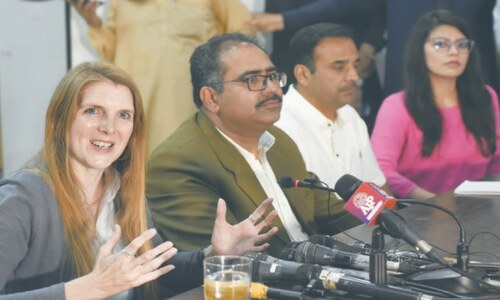ISLAMABAD, Jan 24: The federal government confessed before the Supreme Court, on Thursday, that 700 suspected terrorists were in its custody under internment regulations known as Action in Aid of Civil Power Regulations 2011.
“About 700 people are detained under internment regulations and if this law is against fundamental rights, then I will be the last to support it,” Attorney General Irfan Qadir argued before the Supreme Court.
A three-judge Supreme Court bench comprising Chief Justice Iftikhar Mohammad Chaudhry, Justice Gulzar Ahmed and Justice Sheikh Azmat Saeed had taken up a set of applications highlighting the health conditions of seven surviving prisoners, known as ‘Adiala prisoners’, accused of terrorism.
Although the prisoners are presently not in Adiala jail but are being kept in a separate internment centre.
The whole case came to light, when prisoners mysteriously went missing from Rawalpindi Adiala Jail the day they were acquitted of terrorism charges in May 29, 2010, for their alleged involvement in the audacious October 2009 attacks on GHQ and the ISI’s Hamza Camp Rawalpindi.
The total number of prisoners were 11 but four died in unexplained circumstances, while the remaining seven were produced for the first time before the apex court on February 13, 2012. The prisoners were first sent to the Lady Reading Hospital (LRH) Peshawar for medical treatment on court orders and after five of them recovered they were shifted to an internment centre.
The internment centre is located near Pak-Afghan border at Landi Kotal, Parachinar (Kurram Agency) — tribal area in KPK.
The internment is under Action in Aid of Civil Power Regulations 2011.
Advocate Tariq Asad who vigorously pursued the case of these prisoners and even paid a visit to the centre, described the law as “draconian.” He explained that the regulations were against the fundamental rights of the citizens and inconsistent with a number of provisions of the constitution.
The law violates Article 4 of the constitution, which ensures the rights of citizens because it provides retrospective effect from the year 2008, even though the law was promulgated in 2011, said Asad.
The law also contravenes with Articles 9 (security of person), 10 (safeguards as to arrest and detention and 10A (fair trial) and Article 12 protection against retrospective punishment, since any person can be picked up by the intelligence agencies, deplored Mr Asad.
On the other hand, Secretary Fata Jamal Nasir also appeared before the court to inform that the process of evidence collection against the seven prisoners would be completed within a month, after they would be tried under the Frontier Crime Regulation (FCR) 1901.
When asked why these prisoners would be tried under the FCR, the secretary explained that these prisoners were arrested from the tribal region for launching an ambush on a convoy of security forces in the operational area.
While the AG explained that the prisoners could not be released or handed over to any other agency, till the time the military operation was going on.
But the court reminded the AG that the government was answerable even for a day’s detention, as holding people indefinitely violated their human rights.
“These people cannot be kept in illegal custody for an indefinite period because it is against the constitution and basic fundamental rights,” the chief justice observed. The court will resume hearing of the case on Monday, January 28.














































Dear visitor, the comments section is undergoing an overhaul and will return soon.